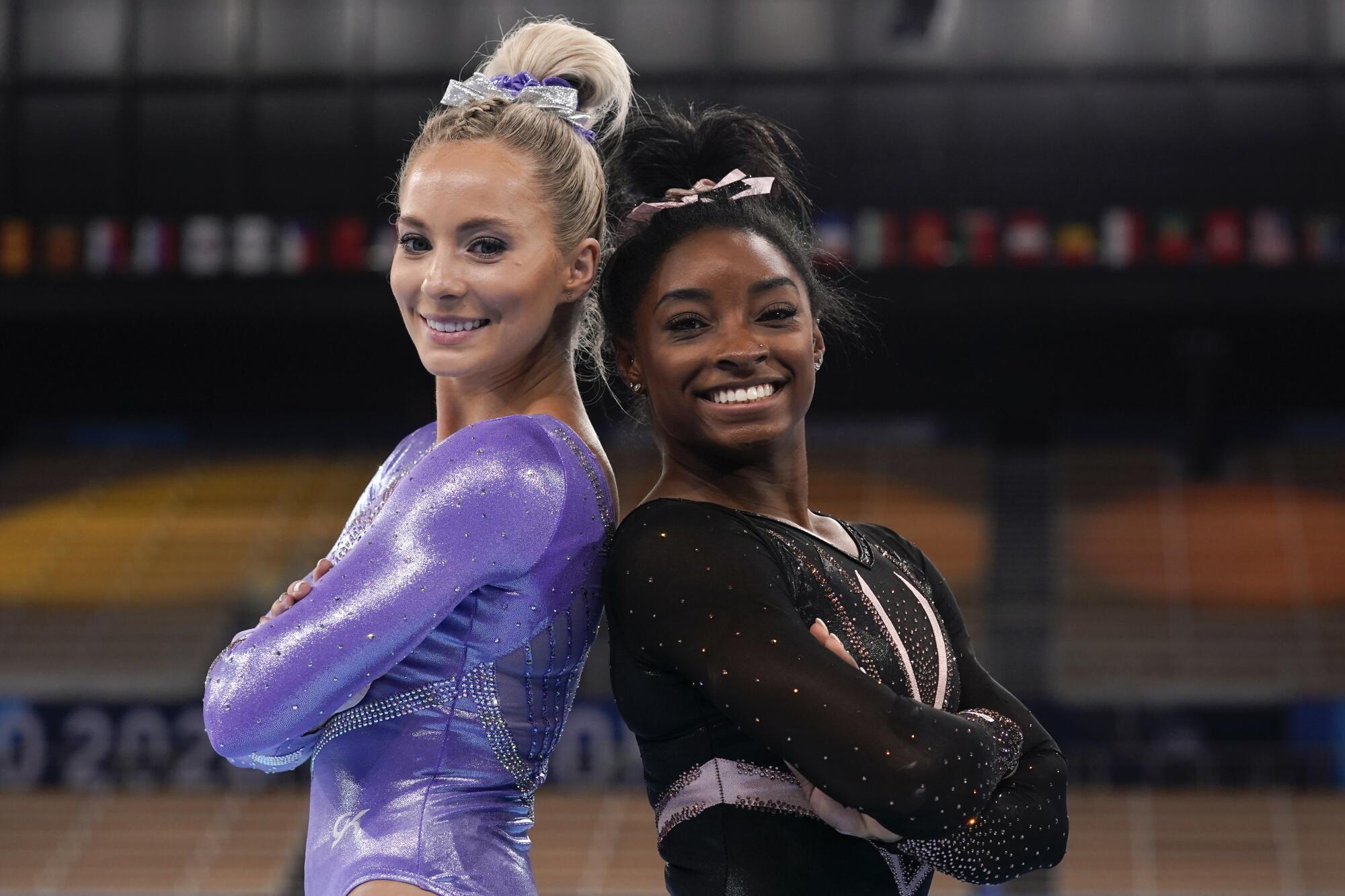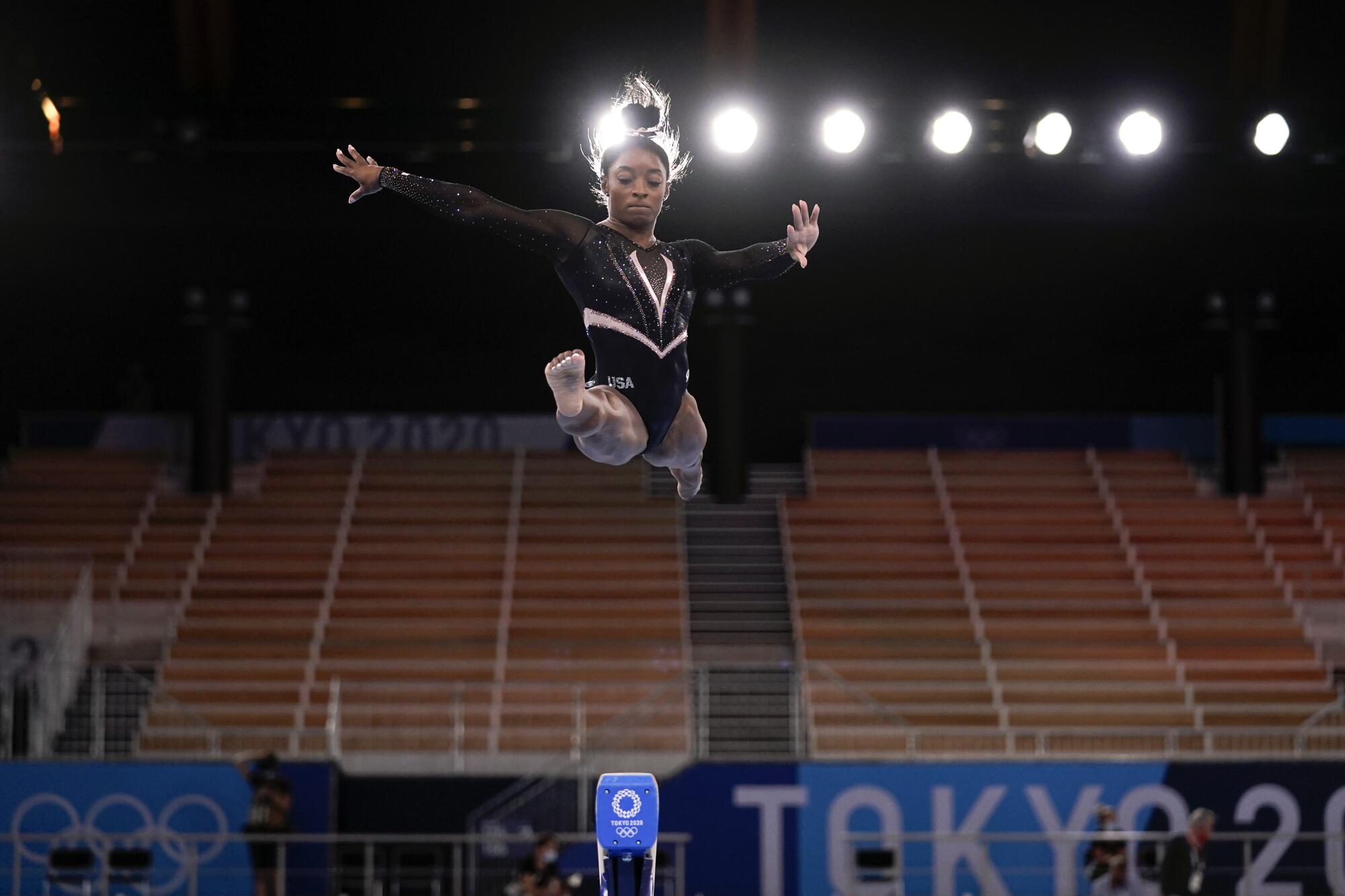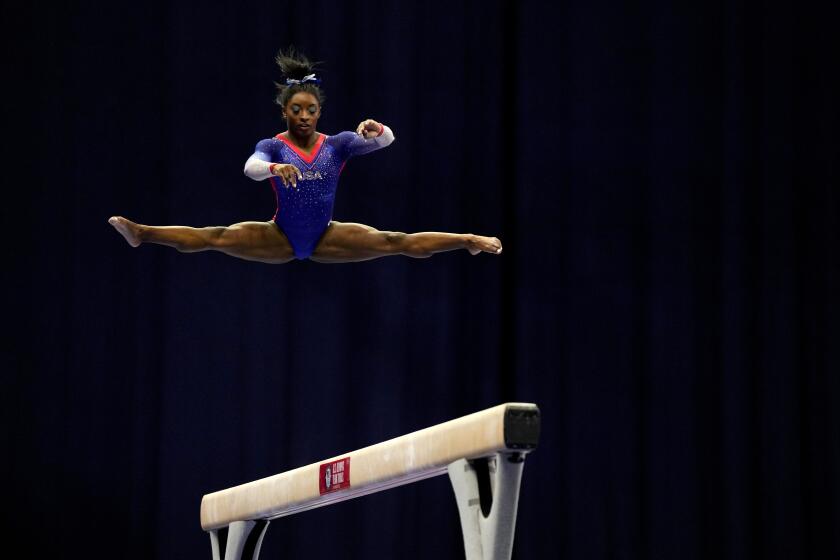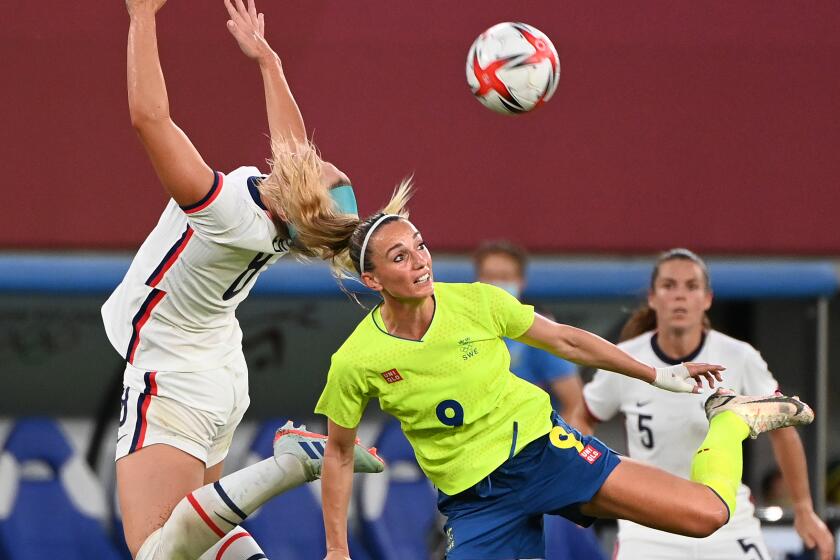
- Share via
TOKYO — The competition floor stretched out behind them and tantalizing possibilities danced in front of them as MyKayla Skinner and Simone Biles smiled for the cameras on Thursday at Ariake Gymnastics Centre. On Sunday, when team qualifying takes place, they will be tumbling and twisting and flying toward medals at the Olympic Games. First, they paused to celebrate the moment, standing back to back in mirrored poses.
The caption Biles chose when she launched the photo into the social media world was surprising: “Little did you know OG means Olympic Grandma’s.”
These “grandmas,” both 24, are not the only medal contenders competing at an age once considered elderly in the sport. Compared to 46-year-old Oksana Chusovitina, who’s extending her own gymnastics Olympics appearance record to eight, Biles and Skinner are kids.
Gymnastics experts and those who have watched Simone Biles’ evolution explain how and why she became so much better than anyone else.
Chusovitina, who won team gold in 1992 with the Unified Team and silver in the vault in 2008 while representing Germany, has hinted at retirement before. She vowed these will be her final Games because she wants to spend more time with her son Alisher, who will be 22 in November. “She feels very good. Very happy that this is her last Olympics. At same time she feels good, she feels bad,” a translator said about Chusovitina’s emotions.
A sport that once put a premium on the acrobatics of tiny, teenaged sprites has become more welcoming to women who are in their 20s, and it’s refreshing. Energy and difficult tricks are entertaining, but there’s a lot to be said for the maturity an “older” gymnast can bring to a performance.
“I think it’s a good thing that gymnasts are getting older and making the sport a little bit more adult,” said Sanne Wevers of the Netherlands, 29, who won gold on the balance beam at Rio in 2016. “It’s more professional and a little bit less like a children’s sport.”

As you get older you learn a lot about yourself, your body, what you need to do, your awareness of your gymnastics, and why you’re doing it. So I think it’s really amazing to see so many older gymnasts staying around in the sport.
— Ellie Black, three-time Canadian Olympic gymnast
Former UCLA standout Danusia Francis, 27, was an alternate for Britain in 2012 and will represent Jamaica here. She thought her gymnastics career had ended when she became a Bruin, but she returned to the more demanding international-level competition with more control over her training.
“At 18, I’m done. It was like you had one shot at the Olympics and if you didn’t make it, you didn’t make it and if you did, you did,” she said.
Staying in the sport has punished her body — she injured her knee shortly before the Tokyo Games — but she has learned how to cope. “Back in the day everyone was doing hundreds of routines but now you take a day off and you recover and that’s actually helpful. It’s really good for you,” Francis said.
The U.S. Women’s National Team can’t take anyone for granted in the Olympics, but the team hasn’t been knocked off the path to gold yet.
Canada’s Ellie Black, a three-time Olympian at 25, attributed gymnasts’ newly lengthened careers to improved equipment and a shift away from the notion that training sessions had to be long and grueling.
“I think everyone has gotten smarter. I think everyone’s realized you don’t need to over-train. There is no right, peak age,” Black said. “You can really use experience to help you in competition and getting stronger. As you get older you learn a lot about yourself, your body, what you need to do, your awareness of your gymnastics, and why you’re doing it. So I think it’s really amazing to see so many older gymnasts staying around in the sport.
“I think it’s very inspiring for the younger generations and I think you’re seeing a lot of countries and gymnastics communities changing the way they do things, changing the way we’re training, being smarter, really listening to the athletes more and really communicating and working together in that aspect of it’s not just one cycle, one Olympics, one competition.”

“Grandma” Biles, who has said she might compete in the 2024 Paris Olympics as an event specialist, is heavily favored in just about every event.
Biles, who won gold in 2016 in the team, all-around, vault and floor exercise events and bronze on the balance beam, is trying to become the first woman to repeat as all-around champion since Vera Caslavska of Czechoslovakia won in Tokyo in 1964 and at Mexico City in 1968. Biles is pretty much a lock, even if she wobbles occasionally. She performs feats no other female gymnast can do and has had four moves named for her, the sport’s tribute to innovative excellence.
Biles made history in May by becoming the first female gymnast to land a Yurchenko double pike vault in competition, but she didn’t need to do that vault to finish first at the Olympic trials. During the American women’s podium training session on Thursday she did the Yurchenko double pike twice and landed it the second time with only a small hop.
“I would injure myself even thinking about trying it,” said Wevers, who trained during the same session as the Americans. “Simone trying to do that is out of this world.”
Francis had previously seen Biles land the vault in training. “It’s just mind-blowing, like insane. I don’t think I’ve been that close to anything that brilliant,” Francis said. “No words. I’m speechless.”
Biles and “Grandma” Skinner own the highest average vault scores this year at 15.550 and 15.233 respectively, according to thegymter.net. Biles and 18-year-old American teammate Sunisa Lee of St. Paul, Minn., could go 1-2 in the all-around event, as they did at the U.S. championships and Olympic trials. Incoming UCLA freshman Jordan Chiles likely won’t be far behind, but a rule that limits each country to two entrants in event finals works against her. Sunday’s competition will determine the eight teams that will compete in the team final, the 24 all-around contestants, and the eight women who will vie for medals on floor exercise, vault, beam and uneven bars.
Lee is dazzling on the uneven bars, and her score of 15.300 on the first day of the U.S. trials is the best recorded this year. Led by 17-year-old Ou Yushan and 16-year-old Guan Chenchen, Chinese gymnasts have earned the top balance beam scores this year, but Biles’ 16.8 difficulty score puts her in contention for gold. Biles’ 6.8 floor exercise difficulty score is well ahead of the 6.0 of Angelina Melnikova of the Russian Olympic Committee, a likely medal contender.
Age is the furthest thing from the gymnasts’ minds. “Everyone here, first and foremost, has to just be grateful and enjoy the moment that this is even happening,” Black said. “There’s been a lot of times in the past year that we didn’t think this was going to happen, especially after last year. I’m just very grateful to be here for the opportunity.”
More to Read
Go beyond the scoreboard
Get the latest on L.A.'s teams in the daily Sports Report newsletter.
You may occasionally receive promotional content from the Los Angeles Times.










